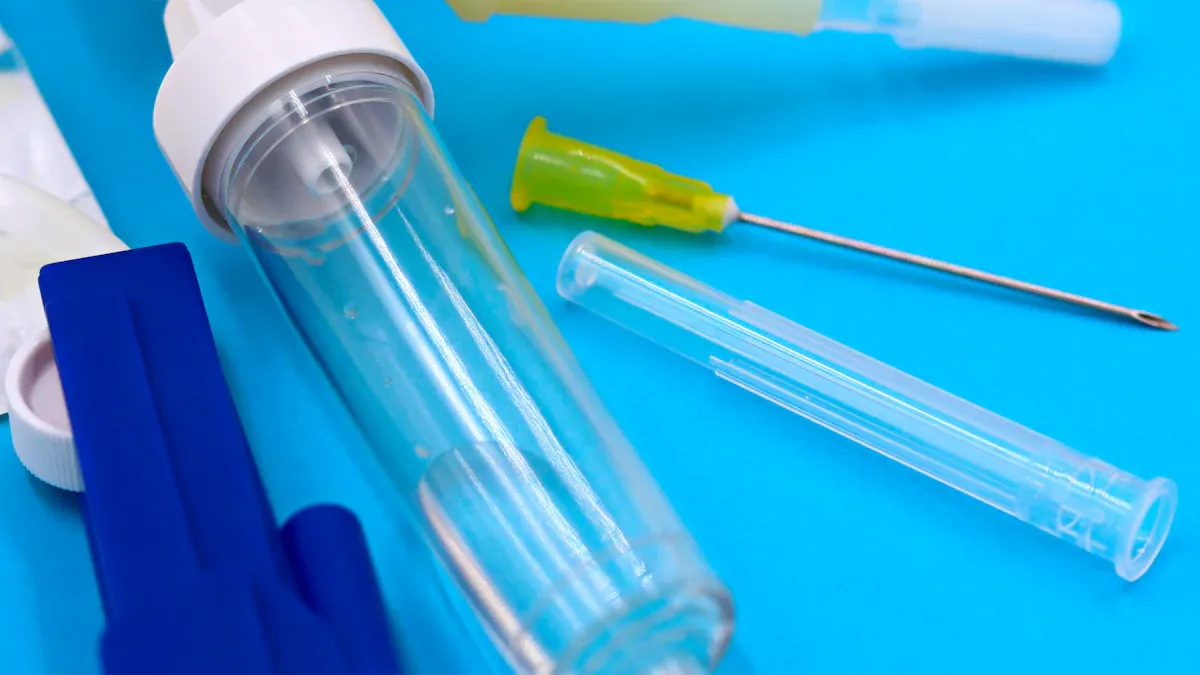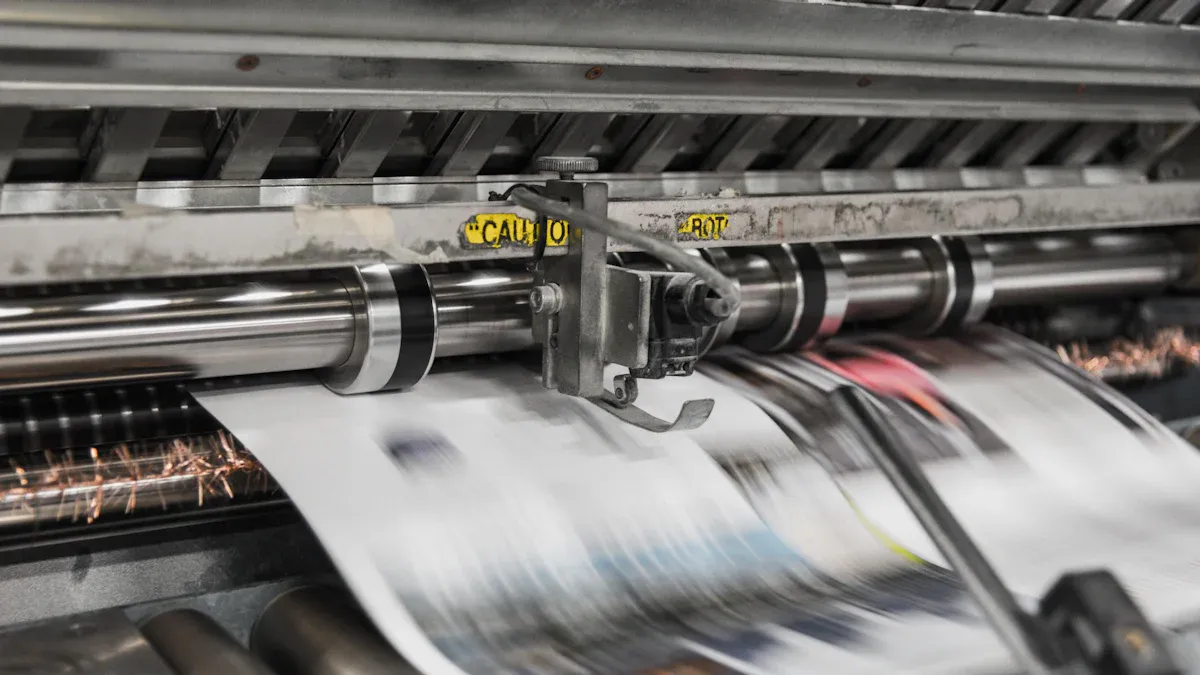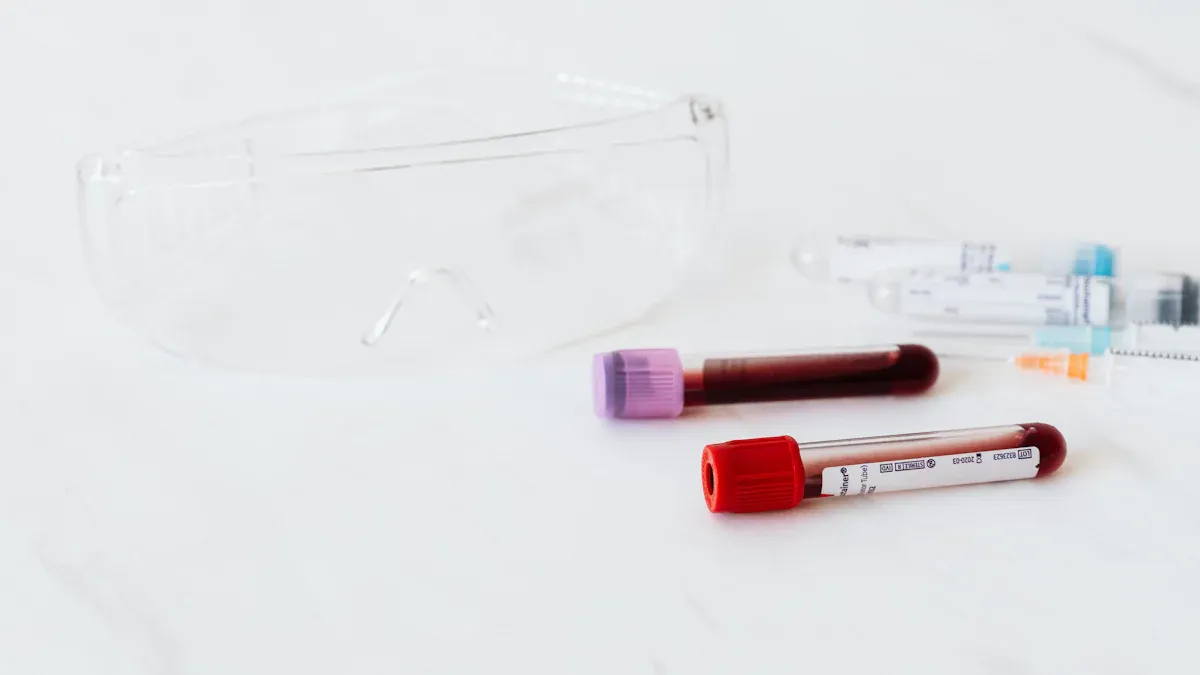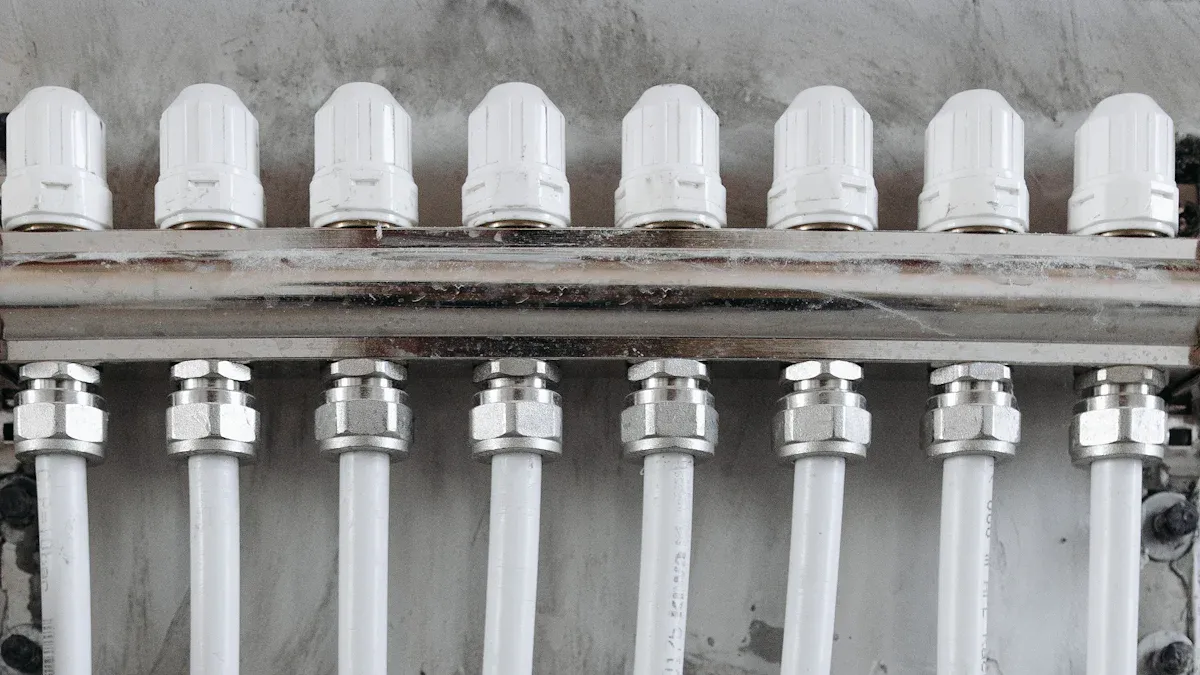How PET Heat Shrink Tubing Supports ISO 10993 and USP Class VI Compliance

PET heat shrink tubing is safe and works well in medicine. It follows ISO 10993 and USP Class VI rules, ensuring safety. This helps protect patients and keeps devices working properly. The tubing can be as thin as 0.1mm. It is also very strong, with strength over 15MPa. It is used in advanced tools like neural probes and catheters. Its chemical resistance and low heat shrink temperature make it useful. It works well with heat-sensitive materials in many medical devices. Over 30 FDA-approved devices in two years use this tubing. This shows it is trusted and approved for medical use.
Key Takeaways
PET heat shrink tubing is safe for medical tools. It meets ISO 10993 and USP Class VI rules.
It is strong and bends easily, fitting many medical devices well.
The tubing can handle chemicals and cleaning methods without breaking.
Using PET tubing keeps patients safe by stopping irritation and staying clean.
This tubing is important for modern medical tools like catheters and electronic parts. It helps them work correctly.
Overview of PET Heat Shrink Tubing

Material Properties of PET
Discover more about PT&C's PET Heat Shrink Tubing and its applications by visiting {this link}.
PET heat shrink tubing has special features for medical use. It is safe for the body and doesn’t cause irritation. This helps keep patients safe during treatments. The tubing bends easily, so it fits different shapes. This makes it great for covering wires in catheters or protecting medical tools.
Its shrink ratio allows it to fit devices perfectly. This ensures the right size for medical equipment. PET resists chemicals, so it lasts longer and doesn’t break down. It also keeps working well in wet places because it resists moisture.
Property | Description |
|---|---|
Biocompatibility | Safe for the body and reduces irritation. |
Flexibility | Bends easily to fit many shapes for medical use. |
Precise Shrink Ratio | Fits devices perfectly with accurate sizing. |
Chemical Resistance | Stays strong even with cleaning chemicals. |
Surface Treatments | Special coatings improve how it works for advanced tools. |
These features make PET heat shrink tubing a trusted choice for doctors needing reliable tools.
Why PET Heat Shrink Tubing is Ideal for Medical Devices
PET heat shrink tubing is strong and lasts a long time. It handles stress well, so it works reliably during use. Its strength and ability to resist bending make it perfect for tough jobs like balloon catheters or blood vessel tools.
The tubing doesn’t break down when cleaned with chemicals or sterilized. It also resists UV light, so it stays strong over time. PET is clear, which helps doctors see through it during procedures.
Feature | PET Heat Shrink Tubing | Other Materials |
|---|---|---|
Mechanical Strength | Very strong | Sometimes weaker |
Chemical Resistance | High | Lower |
Clarity | Very clear | Sometimes unclear |
Durability | Long-lasting | Varies |
Biocompatibility | Yes | Not always safe |
Sterilization Compatibility | Yes | Not always possible |
PET heat shrink tubing is safe for medical use and fits devices securely. These qualities make it a top choice for doctors who care about safety and performance.
ISO 10993 and USP Class VI Compliance

Key Requirements of ISO 10993 for Medical Devices
ISO 10993 sets rules for safe materials in medical devices. These rules make sure materials like PET heat shrink tubing are safe for the body. The standard groups devices by how long they touch the body and where. This helps companies know what tests are needed to follow the rules.
Tests check how the material reacts with the body. For example, they look for harmful effects like irritation or allergies. These tests prove PET heat shrink tubing is safe for medical use.
Regulatory Standard | Description |
|---|---|
ISO 10993 | Sets safety rules for medical devices based on body contact and time. |
By following ISO 10993, PET heat shrink tubing keeps patients safe and meets medical rules.
USP Class VI Certification and Its Importance
USP Class VI certification is a key safety test for medical materials. It checks if materials used in devices are safe for the body. Tests include injections, toxicity checks, and implant evaluations. These tests show PET heat shrink tubing is safe for medical use.
The United States Pharmacopeia (USP) creates these rules to protect health. Many devices need USP Class VI certification to prove they are safe and reliable.
Aspect | Description |
|---|---|
Organization | USP is a nonprofit that sets safety rules for products. |
Testing Requirements | USP Class VI tests include injections, toxicity, and implant checks. |
Importance for Devices | Many devices need USP Class VI certification to ensure safety. |
Medical-grade standards are important for tubing in devices.
Certifications like ISO 10993 and USP Class VI show materials are safe.
Strong materials help devices stay safe and work well over time.
USP Class VI certification builds trust in PET heat shrink tubing for medical use.
How PET Heat Shrink Tubing Meets Compliance Standards
PET heat shrink tubing passes many tests to meet ISO 10993 and USP Class VI rules. These tests prove it is safe, strong, and good for medical devices. Its thin walls and chemical resistance make it great for precise jobs.
Labs test PET heat shrink tubing to check it meets safety rules. For example, UL/CSA 224 tests insulation tubing, and AMS-DTL-23053 checks heat shrink tubing. These tests look at strength, flexibility, and how it handles oil and electricity.
Specification | Description | Testing Requirements |
|---|---|---|
UL/CSA 224 | Sets rules for insulation tubing. | Tests strength, oil resistance, flexibility, and voltage. |
AMS-DTL-23053 | Sets rules for heat shrink tubing. | Tests weight, fungus resistance, and electrical safety. |
3-A Sanitary Standards | Sets health rules for materials. | Must pass tests at approved labs. |
By passing these tests, PET heat shrink tubing meets FDA rules and medical standards. Its safety and strength make it a trusted choice for medical devices.
Benefits of PET Heat Shrink Tubing in Medical Applications
Biocompatibility and Patient Safety
PET heat shrink tubing helps keep patients safe during procedures. It is biocompatible, meaning it works well with the body. This reduces irritation or bad reactions when it touches tissues. The tubing also stays clean and sterile, which is important in surgeries. Studies show it fights germs effectively (p ≤ 0.05 and p < 0.001).
This tubing meets ISO 10993 rules, proving it is safe for medical use. Its smooth surface lowers friction, making it easy to insert without causing pain. Using PET heat shrink tubing means choosing safety and reliable performance for medical needs.
Tip: Doctors trust PET heat shrink tubing because it meets strict safety rules and improves patient care.
Durability and Chemical Resistance
PET heat shrink tubing is strong and lasts a long time. It handles stress well, so it doesn’t break during use. This makes it perfect for tough medical jobs. You can count on it to stay in good shape even in hard conditions.
It also resists damage from cleaning chemicals and sterilization methods like gamma rays or autoclaving. This keeps the tubing working well over time. It even stands up to UV light, making it great for short or long-term use.
Key Benefits of PET Heat Shrink Tubing:
Stays strong during surgeries and tough tasks.
Doesn’t break down from cleaning or sterilizing.
Works well even in sunlight or UV exposure.
Using PET heat shrink tubing ensures medical tools stay safe and reliable for a long time.
Precision and Ease of Use in Manufacturing
PET heat shrink tubing is very precise, making it great for building medical devices. It shrinks perfectly to fit parts tightly, keeping everything secure. Its accurate size and reliable performance make it easy to use.
Tests show it is simple to handle during manufacturing. Its thin walls save space inside devices, and its smooth surface makes assembly easier. The table below shows its key features:
Quality Control Metrics | Details |
|---|---|
Diameters | 0.006"–0.020" (±0.001", typical); 0.021"–0.5" (±5%, typical) |
Wall Thickness | 0.0001"–0.0005" (±0.0001", typical); 0.0006"–0.004" (±20%, typical) |
Temperature Range | -196°C to 135°C (long-term); Up to 200°C (short-term); Melting: 235°C |
Electrical Properties | Dielectric strength: >4,000 V/mil; Volume resistivity: 10^18 Ohm-cm |
Sterilization Methods | Ethylene oxide, Gamma radiation, Autoclaving |
Biocompatibility | Complies with ISO 10993 standards |
This tubing works well with heat-sensitive materials and advanced techniques like laser welding. Its precision helps devices meet FDA rules and perform well in important medical tasks.
Note: PET heat shrink tubing is essential for making high-quality medical tools and devices.
Uses of PET Heat Shrink Tubing in Medical Devices
Catheters and Balloon Catheter Bonding
PET heat shrink tubing is important for catheters and balloon bonding. It is strong and fits tightly, keeping parts secure. This tight fit helps catheters work well under high pressure. The tubing’s thin walls leave more space inside for better fluid flow.
Tests show how reliable this tubing is for tough jobs:
Metric | What It Measures |
|---|---|
Fatigue Life | How long it lasts under repeated use. |
Tensile Strength | The heaviest load it can handle before breaking. |
Residual Elongation | The stretch difference between pulling and releasing. |
These qualities make PET heat shrink tubing great for catheters. It keeps them strong and safe for patients.
Insulation for Medical Electronic Parts
PET heat shrink tubing is great for covering medical electronic parts. It stops electrical problems with its strong insulation, over 4,000 V/mil. It also protects wires from damage, water, and heat.
Tests prove its protection works well:
Test Type | What It Does |
|---|---|
Abrasion Resistance | Stops wires from wearing out. |
Moisture Resistance | Keeps wires safe from water. |
Temperature Resistance | Works in very hot or cold conditions. |
Chemical Resistance | Stays strong against cleaning chemicals. |
PET tubing keeps medical electronics safe and working well.
It helps devices stay reliable, even in tough conditions.
This tubing is key for protecting wires and ensuring devices work properly.
Protection for Delicate Medical Tools
PET heat shrink tubing protects delicate medical tools very well. It is safe for the body and keeps tools strong. Its chemical resistance and sterilization ability make it perfect for hospitals.
Main benefits include:
Protecting fragile medical tools from damage.
Resisting chemicals and cleaning methods like gamma rays.
A smooth surface that stops germs from growing.
Insulating electronics to avoid electrical problems.
PET heat shrink tubing is a trusted choice for keeping medical tools safe and lasting longer.
PET heat shrink tubing is important for making medical devices. It follows ISO 10993 and USP Class VI rules to stay safe. Its biocompatibility helps protect patients during important treatments. The tubing is strong and works in many ways, making it great for medical tools. Using PET heat shrink tubing improves how devices work and helps patients feel better. It also meets FDA rules, ensuring safety and high quality.
Tip: Pick materials that meet safety rules for the best medical tools.
FAQ

What is PET heat shrink tubing used for in medical devices?
PET heat shrink tubing protects and covers parts in medical tools. It is strong, safe for the body, and very precise. It is used for catheters, covering wires, and protecting fragile tools. Its many uses make it important for making medical devices.
How does PET heat shrink tubing ensure patient safety?
PET heat shrink tubing follows ISO 10993 and USP Class VI rules. This proves it is safe for the body. It resists chemicals and cleaning methods, staying safe for tissues. Its smooth surface stops irritation, making it great for sensitive uses.
Can PET heat shrink tubing withstand sterilization processes?
Yes, PET heat shrink tubing handles cleaning methods like gamma rays, autoclaving, and ethylene oxide. It stays strong and works well even after many cleanings. This makes it a trusted choice for medical tools.
Why is PET heat shrink tubing preferred for catheters?
PET heat shrink tubing fits tightly, bonds well, and has thin walls. These thin walls leave more space inside catheters. It is flexible and strong, working well under pressure. This makes it a top choice for making catheters.
What makes PET heat shrink tubing unique compared to other materials?
PET heat shrink tubing is very strong, safe, and resists chemicals. It is clear, shrinks perfectly, and works with heat-sensitive parts. These features make it perfect for medical tools that need to be reliable and high-performing.
See Also
Essential Insights on PET Heat Shrink Tubing for Electronics
The Importance of Ultra-Thin PET Heat Shrink Tubing in Healthcare
Comparing Medical and Industrial Grade Heat Shrink Tubing
The Significance of Gamma Radiation Resistant Tubing in Medicine
Exploring FEP Non-Toxic Heat Shrink Tubing for Industrial Applications

